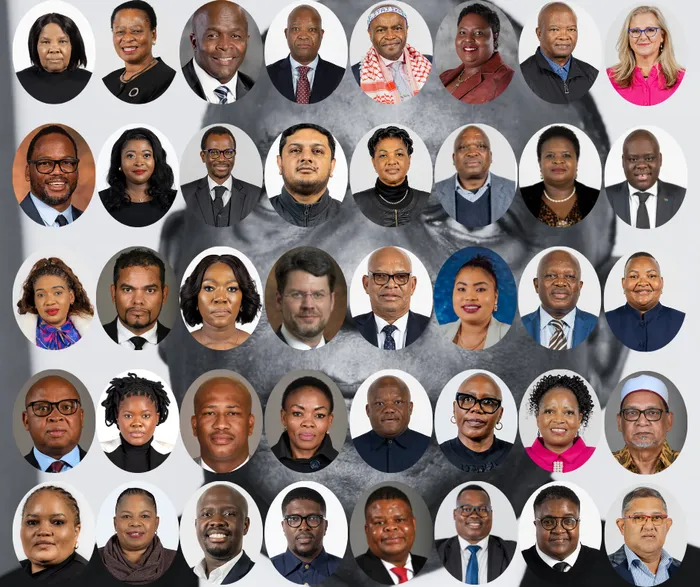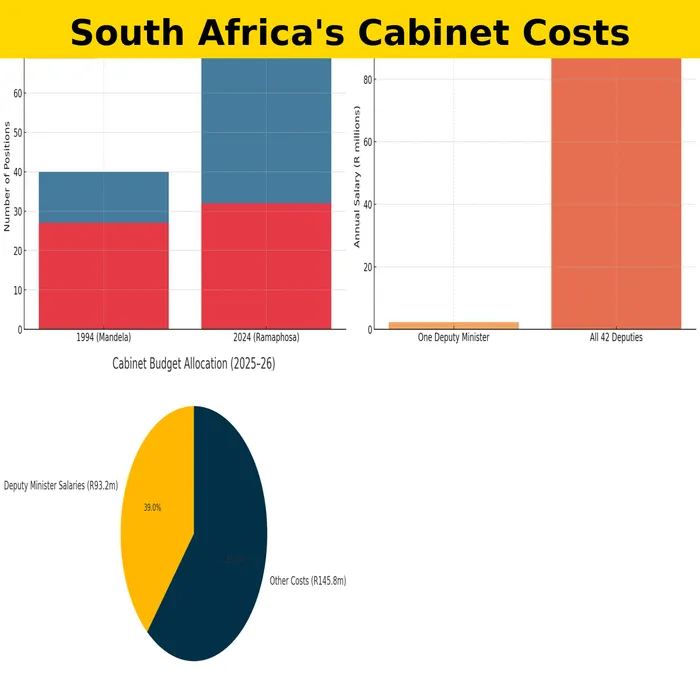Cabinet of cronies: Ramaphosa slammed for defending 42 deputies draining taxpayers of R93.2m a year

President Cyril Ramaphosa is under fire for defending his bloated Cabinet, including 42 deputy ministers despite it costing taxpayers more than R95m a year.
Image: GCIS / IOL Graphics
Corruption watchdog Organisation Undoing Tax Abuse (OUTA) and political analysts have slammed President Cyril Ramaphosa for defending his bloated Cabinet, including 42 deputy ministers, saying it’s more about political favours than good governance and comes at a high cost to taxpayers.
During an oral question session in the National Assembly on Tuesday, Ramaphosa said deputy ministers play a critical role in assisting ministers with their responsibilities and should be entrusted with more duties.
“Those deputy ministers are distinguishing themselves as real contributors to our governance. And what I also really appreciate is the fact that many of our deputy ministers are working so well with their minister colleagues,” Ramaphosa told Parliament.
Despite mounting criticism over the size and cost of the Cabinet, Ramaphosa defended his appointments, saying the Constitution allows for the inclusion of deputy ministers, and that those appointed in June 2024 were adding value to the government.
The current Cabinet size has raised eyebrows, particularly after the 2024 elections, which saw the formation of a Government of National Unity (GNU) and the expansion of the executive.
The total budget allocation for new ministries and deputy ministries amounts to R239 million for the 2025 and 2026 financial year, with carry-through costs over the medium-term expenditure framework.
Including perks such as support staff, vehicles, security, and office costs, the overall expenditure is significantly higher.
Deputy ministers earn R2.22 million annually, with the total salary bill for all 42 amounting to R93.2 million per year.

Deputy ministers earn R2.22 million annually, with the total salary bill for all 42 amounting to R93.2 million per year.
Image: IOL Graphics
Ramaphosa argued that the GNU necessitated the current Cabinet structure. The ANC is leading the GNU after it failed to get more votes during the May 2024 general elections.
“It was not possible to reduce the number of ministries when I announced the Cabinet, as we needed to ensure inclusivity among GNU partners,” he said.
“You may recall that from the start I expressed a desire for a smaller executive. That remains my wish, but we had to accommodate various parties in the GNU who requested a broader executive.”
Despite his defence, critics say the justification falls flat.
CEO of OUTA, Wayne Duvenage, told IOL News Ramaphosa’s justification for a bloated executive was disingenuous and motivated by political convenience rather than public interest.
“OUTA has consistently raised concerns about South Africa’s bloated executive. The President himself admits he would prefer a smaller executive, yet once again political expediency has trumped principle,” Duvenage said.
He criticised the government for using ministries and deputy minister roles as rewards for political loyalty, saying many are ineffective and redundant.
“The truth is, deputy ministers have very little visible impact. In many cases, their roles overlap with those of ministers or senior civil servants,” he told IOL News.
“Some departments, such as Police and Water and Sanitation, have more than one deputy minister, which makes no sense from a governance perspective.”
Duvenage added that scrapping the positions could offer both symbolic and fiscal relief.
“The R93.2 million in salaries is just the start. When you add perks, staff, offices, security, vehicles and housing, the bill climbs dramatically. While it won’t fix South Africa’s debt crisis, scrapping these posts would signal a government serious about cutting waste - just as it expects households to do.”
Political analyst Solly Rashilo echoed OUTA’s concerns, calling Ramaphosa’s “training ground” defence for deputy ministers weak and contradictory to the ANC’s pre-election pledge to shrink the Cabinet.
“South Africa is facing economic hardship and underfunded services. This oversized executive feels like a betrayal,” Rashilo said.
“The claim that deputies do a ‘good job’ lacks evidence. Multiple deputies in the same departments seem redundant, likely serving political deals rather than public needs.”
He supported ActionSA’s private member’s bill, which aims to scrap deputy minister roles entirely.
“I support abolishing these roles. They reflect patronage more than competence. Ministers can be supported by experienced advisors and civil servants, without the need for costly deputies,” Rashilo said.
He estimated the total savings from eliminating deputy ministers, including perks, could range between R200 million and R300 million annually.
ActionSA’s parliamentary leader and MP, Athol Trollip, questioned whether the President and ANC would support his bill to remove deputy minister positions and redirect the funds to essential services.
Ramaphosa responded by saying he would review the bill before offering support.
OUTA confirmed it had formally submitted support for the bill.
“We believe it’s a credible and necessary step. South Africa’s executive is now one of the largest in the world - not just because of the 42 deputy ministers, but also due to the 32 ministries currently in place,” Duvenage said.
He drew comparisons to former President Nelson Mandela’s first democratic Cabinet in 1994, which had only 27 ministries and 13 deputy ministers.
Duvenage said the recent cabinet reshuffles illustrate the problem.
“The splitting of Higher Education, Science and Innovation into two separate ministries appears to have been done to keep Blade Nzimande in Cabinet, even though the split was unnecessary.
He said new ministries are being created not out of necessity but to protect underperforming ministers.
“Electricity was hived off into its own portfolio instead of being reabsorbed into the Department of Minerals and Petroleum, largely because of the individual occupying that role.”
“These kinds of manoeuvres show how ministries are multiplied to suit political expediency, not service delivery. A leaner, more accountable government would free resources for frontline services and help rebuild public trust,” he added.
IOL Politics